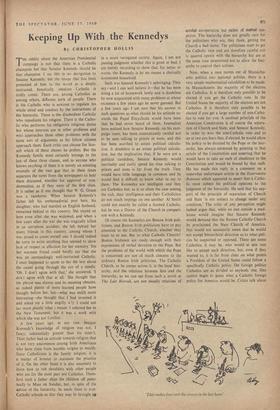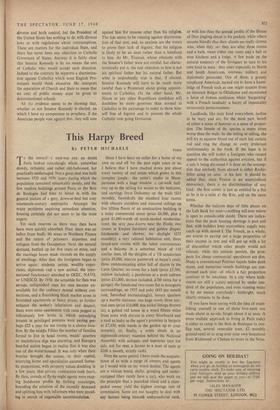Keeping Up With the Kennedys
By CHRISTOPHER HOLLIS
HE oddity about the American Presidential 1 campaign is not that there is a Catholic champion but that Senator Kennedy should be
that champion. I say this in no derogation to Senator Kennedy. but the image that has been presented of him to the world as a deeply instructed, fanatically obedient Catholic is richly comic. There are, among Catholics as among others, different sorts of people. There is the Catholic who is anxious to regulate his whole mind and conduct by the instructions of the hierarchy. There is the disobedient Catholic who repudiates his religion. There is the Catho- lic who performs his obligatory religious duties but whose interests are in other problems and who approaches those other problems with the same sort of arguments as his fellow citizens approach them. Each critic can choose for him- self which of these classes he prefers. But the Kennedy family most certainly belongs to the last of these three classes, and to anyone who knows anything of them it is merely an amusing example of the vast gap that in these times separates the news from the newspapers to hear them discussed, whether for approval or con- demnation, as if they were of the first class.
It is rather as if one thought that W. G. Grace was a racehorse. When Senator Kennedy's father left his ambassadorial post here, his daughter, who had married an English husband, remained behind in this country. She stayed on here even after she was widowed, and when a few years after the war she was tragically killed in an aeroplane accident, she left behind her many friends in this country, among whom I was proud to count myself one. I should indeed be sorry to write anything that seemed to show lack of respect or affection for her memory. Yet her warmest friend could hardly say that she was an outstandingly well-instructed Catholic. once happened to quote to her the text about the camel going through the eye of a needle.
`Oh I don't agree with that,' she answered. 'I don't agree with that at all.' She thought that the phrase was clumsy and its meaning obscure, as indeed plenty of more learned people have thought before her, but—what was mach more interesting—she thought that I had invented it
and asked me a little angrily w'-iy I could not say more plainly what t meant. I referred her to the New Testament, but it was a work with which she was not familiar.
A few years ago, at any rate. Senator Kennedy's knowledge of religion was not, I fancy, substantially greater than his sister's.
Their father had an attitude towards religion that is not very uncommon among Irish Americans who have risen from humble origins to wealth.
Since Catholicism is the family religion, it is a matter of honour co maintain the practice of it. On the other hand it is also necessary to learn how to rub shoulders with other people who are for the most part not Catholics. There- fore such a father ships his children off punc- tually to Mass on Sunday, but, in spite of the advice of the hierarchy, he sends them to non- Catholic schools so that they may be brought up in a more variegated society. Again, I am not passing judgment whether this is good or bad. I am merely recording to show that, for better or worse, the Kennedy is by no means a clerically dominated household.
Such was Senator Kennedy's upbringing. They say—and I can well believe it—that he has been doing a lot of homework lately and is doubtless by now acquainted with many problems at whose existence a few years ago he never guessed. But a few years ago I am sure that his answer to such questions as what should be his attitude to- wards the Papal Encyclicals would have been that he had never heard of them. Journalists have noticed how Senator Kennedy, on his cam- paign tours, has been ostentatiously careful not to be seen talking to priests or nuns, and this has been ascribed to astute political calcula- tion. It doubtless is an astute political calcula- tion, but the implication that, if he were not a political candidate, Senator Kennedy would inevitably and easily spend his time talking to priests and nuns is far from the truth They would have little language in common and he would find it difficult to know what to say to them. The Kennedys are intelligent and they are Catholics but, as is so often the case among the rich, their intelligence and their Catholicism do not much impinge on one another Al Smith could not exactly be called a learned Catholic, but he was a Doctor of the Church in compari- son with a Kennedy.
Of course the Kennedy's are Boston Irish poli- ticians, and Boston Irish politicians have to pay attention to the Catholic Church. whether they want to or not. But to what Catholic Church? Boston Irishmen are ready enough with their expressions of verbal devotion to the Pope. But the problems of the world with which the Pope is concerned are not of much concern to the ordinary Boston Irish politician. The Catholic Church, as he comes across it, is the local hier- archy, and the relations between him and the hierarchy, as we can see from such a novel as 7'he Last Hurrah, are not usually relations of cordial co-operation but rather of mutual sus- picion. The hierarchy does not greatly care for the politicians who are, they think, getting the Church a bad name. The politicians want to get the Catholic vote and are therefore careful not to quarrel openly with the hierarchy but are at the same time determined not to allow the hier- archy to control their actions.
Now, when a man moves out of Massachu- setts politics into national politics, there is a very simple mathematical calculation to be made. In Massachusetts the majority of the electors are Catholics. It is therefore only possible to be elected if you get the Catholic vote. In the United States the majority of the electors are not Catholics. It is therefore only possible to be elected if you get a large number of non-Catho- lics to vote for you. A cardinal principle of the American Constitution is of course the separa- tion of Church and State, and Senator Kennedy, in order to woo the non-Catholic vote and to set at rest any fears that, if elected, he would allow his policy to be dictated by the Pope or the hier- archy, has always answered by pointing to that article of the Constitution and asserting that he would have to take an oath of obedience to the Constitution and would be bound by that oath. He has made this reply in a comment on a somewhat unfortunate article in the Osservatore Romano which appeared to assert that a Catho- lic must submit his political opinions to the judgment of the hierarchy. He said that his sup- port of the principle of separation of Church and State 'is not subject to change under any condition.' The critic of any perception might indeed argue that, while no one outside a mad- house would imagine that Senator Kennedy would demand that the Roman Catholic Church be proclaimed the State Church of America, that would not necessarily mean that he would not accept hierarchical direction as to what poli- cies he supported or opposed. There arc some Catholics, it may be, who would at any rate like to accept such direction, but, even if they wanted to, it is far from clear on what points a President of the United States could follow a specifically Catholic policy. On foreign politics Catholics are as divided as anybody else. One cannot begin to guess what a Catholic foreign policy for America would be. Critics talk about
'Thal makes four anti-flu viruses in the last hour.' divorce and birth control, but the President of the United States has nothing to do with divorce laws or with regulations about contraceptives. These are matters for the individual State, and there has never been any objection to Catholic Governors of States. Anyway it is fairly clear that Senator Kennedy is by no means the sort of Catholic who would accept such direction. Indeed to the contrary he supports a discrimina- tion against Catholics which most English Pro- testants would think excessive. He interprets the separation of Church and State to mean that no cent of public money must be given to denominational schools.
All the evidence seems to be showing that, whether or not Senator Kennedy is elected, on which I have no competence to prophesy, if the American people vote against him, they will vote against him for reasons other than his religion. The tide seems to be running against discrimina- tion of that sort, and, so anxious are the voters to prove their lack of bigotry, that his religion is likely to be an asset rather than a handicap to him. As Mr. Truman, whose relations with the Senator's father were not cordial, has charac- teristically put it, the real objection to him is not his spiritual father but his natural father. But whht is undoubtedly true is that, if elected, Senator Kennedy will have to be much more careful than a Protestant about giving appoint- ments to Catholics. On the other hand, Mr. Nixon or any other Republican candidate will doubtless be more generous than normal to Catholics in his patronage in order to show him- self free of bigotry and to prevent the whole Catholic vote going Democrat.











































 Previous page
Previous page